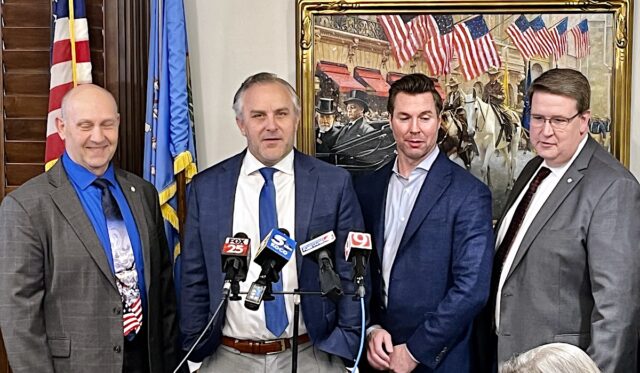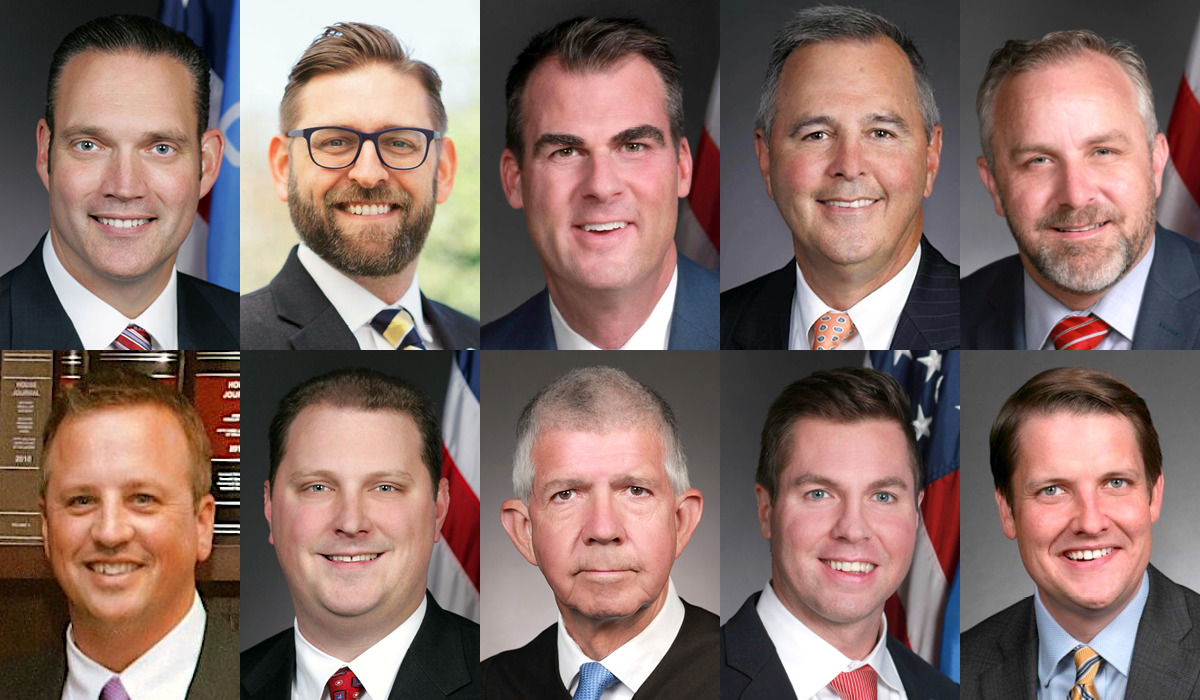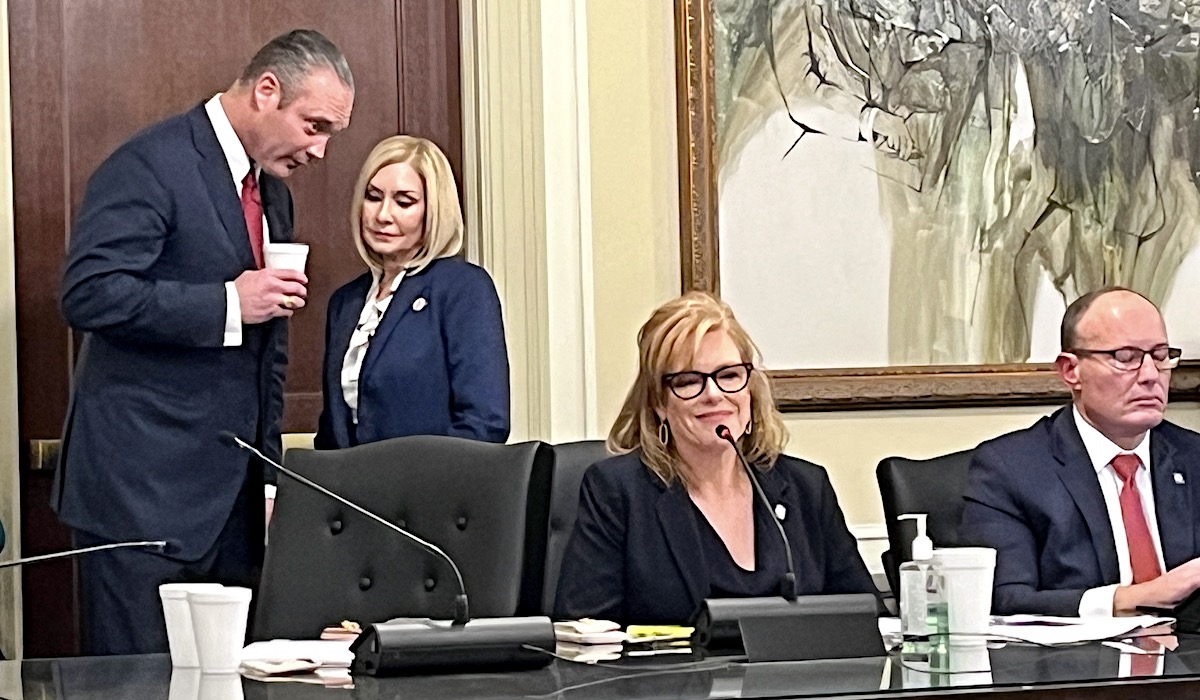
(Update: Four days after the publication of this article, Republican leaders of the Oklahoma Legislature announced an education deal Monday, May 15.)
After nearly three months of acrimonious negotiations between the House and the Senate over a massive education funding and reform package, leaders of the Oklahoma Legislature have made significant progress toward a deal that would pump upwards of $600 million into public education and create new refundable tax credits for private school and homeschool families.
While last week ended with Senate and House leaders grousing about their counterparts in dueling press conferences, negotiations resumed and made headway Monday at the Governor’s Mansion just east of the State Capitol. Lawmakers entered the year with more than $1 billion in additional recurring revenues they could appropriate and about $4 billion in state savings accounts. Questions about economic development opportunities and calls for tax cuts have combined with requests for teacher pay raises and school choice reforms to shape this year’s session.
For about eight hours, former Oklahoma Supreme Court Chief Justice Steven Taylor served as a mediator over the education negotiations among the three legs of the proverbial political stool:
- House Speaker Charles McCall (who brought his chief of staff, Rick Rose, and House Majority Floor Leader Jon Echols);
- Senate President Pro Tempore Greg Treat (who brought his chief of staff, Jeff Peters, and Senate Education Committee Chairman Adam Pugh); and
- Gov. Kevin Stitt (who brought his chief of staff, Brandon Tatum, and Secretary of State Brian Bingman).

With a portion of time dedicated to shuttle diplomacy between the Senate (upstairs) and the House (downstairs) in the Governor’s Mansion, the McAlester attorney’s Monday mediation helped break the policy logjam that has turned this year’s regular session into one of Oklahoma’s least functional efforts at self-governance in recent memory.
The House moved off of its demand to create the constitutionally questionable Oklahoma Student Fund, and the Senate agreed to reduce the teacher raise amounts and fund those raises even for districts “off” of the state funding equalization formula. As an alternative to the House’s desired “Student Fund,” negotiators developed a proposed “grant program” for funding school district innovations that would be prioritized for rural schools in its first year.
But that final portion of Monday’s negotiation was received poorly Tuesday in both Republican Caucuses, with rank and file legislators calling the concept confusing and bristling over the idea that Superintendent of Public Instruction Ryan Walters and the State Board of Education would be tasked with administering and approving applications to the grant program.
“The grant proposal went over as well as a turd in the punch bowl at a swearing-in ceremony,” said one Republican lawmaker on the condition of anonymity.
With the grant program panned by their peers, legislative leaders rejoined Stitt and Taylor — the mediator, who also serves on the State Regents for Higher Education — for further discussions Wednesday, with new parties entering the room: Senate Floor Leader Greg McCortney (R-Ada), Sen. Dewayne Pemberton (R-Muskogee), House Common Education Committee Chairwoman Rhonda Baker (R-Yukon) and Rep. Mark McBride (R-Moore).
On Wednesday, Pugh and McBride concluded their conversations with a handshake agreement on a potential package that they would take back to their respective leaders. It included:
- About $286 million in new appropriations to fund teacher pay raises of $3,000, $4,000, $5,000 and $6,000 (based on longevity) for all school districts, including those off of the formula;
- An additional $214 million of new appropriations into the state funding equalization formula;
- Three modifications for the state funding formula that would increase funding for bus transportation, schools with higher percentages of socio-economically disadvantaged students, and greater eligibility for the “small school” formula weight that would increase funding for hundreds of rural schools; and
- A total of $100 million of funding for next fiscal year in the Redbud Fund, which was created in 2021 to address property tax revenue disparities in districts with lower ad valorem bases.
“I can tell you that the conversations have moved along more in the last week than they did from February to this point,” Treat (R-OKC) told media Thursday. “So I can’t say enough good about former Chief Justice Taylor, he has been a rock star in every way, an impartial mediator who’s moved this conversation along.”
‘Hopeful a deal will be reached in the coming days’

While Taylor may have led the horses to water this week, whether they choose to drink remains their decision. Simply pushing them together in recent days has been like floating pulling teeth, and finalizing the nascent deal has proven difficult.
With rumors of the chambers getting close to an agreement on public education funding — which would then unlock a proposal for new refundable tax credits for private school and homeschool families — Treat, Pugh, McCortney and Pemberton called a press conference Thursday afternoon to disclose the state of negotiations.
“I was proud of the efforts that Rep. McBride and Rep. Baker, Sen. Pemberton and Sen. Pugh put forth,” Treat said. “They had a two-hour meeting (Wednesday) that resulted in an agreement — between the negotiators at least. Unfortunately, the House has come back today and wants to do some modifications to that agreement, and so we’re not where we thought we’d be today standing before you.”
Although McCall cancelled his planned media availability after the Senate’s press conference, lawmakers described the House’s response as a request for an additional $100 million into the Redbud Fund for school districts with lower property tax revenues. That would take the price tag for the new public education funding from about $600 million to about $700 million.
“Yesterday, the House pivoted away from the Oklahoma Student Fund approach to the Senate’s approach through the funding formulas,” McCall said in a statement. “After review of the new approach, the House made a written offer of $700 million in new recurring public education funding — the only written offer submitted — which was rejected.”
McCall said “there was no written offer or agreement reached last night,” a statement with which McBride agreed.
“Yesterday, I didn’t think it was really a deal. It was more a conversation. We were going to go back to leadership,” said McBride, who emphasized that working with Taylor and the senators was “great” on Wednesday.
In a move hearkening back to the 2018 session when McBride signed an agreement with House Democrats to support the historic revenue package that created the funding for the teacher pay raise that year and dramatically strengthened state finances, McCall sent McBride to the Senate today with the request for the additional $100 million into the Redbud Fund.
When Senate leaders rejected the request, McBride said he rolled the dice and ad libbed, reducing the request to $50 million and saying he would “take it on the chin” from McCall if his efforts to land the deal upset the speaker.
To his surprise, McBride said Senate leaders also rejected the $50 million request. When he came clean to McCall about his second offer to the Senate, McBride said the speaker appreciated his attempt to get a deal done.
“The House is encouraged by negotiations and are hopeful a deal will be reached in the coming days,” McCall said.
Treat said he believes a deal would be made easier if the final negotiations were hashed out in public.
“I’ve continually called for public negotiations — I reiterate that call,” Treat said. “I think Justice Taylor was a great step in that direction because you had an impartial Oklahoman sitting in the room helping mediate — tremendously helpful. I can’t underscore that enough. But the public deserves to know what was on the table.”
Speaking to media Thursday morning, Stitt also praised Taylor’s mediation efforts and implored legislative leaders to find a way “to land the plane.”
“Let’s take the win. Let’s stop fighting about whether this district got more than this district or whether the win should have been bigger for my school district,” Stitt said. “We were kind of driven to our corners. It’s taken a while to kind of get to the point where we can all agree.”
The Oklahoma Constitution requires the Legislature to adjourn this year’s regular session by 5 p.m. Friday, May 26. Because lawmakers want to ensure that they have time to consider and potentially override any Stitt vetoes of policy bills or budget items, they intend to send Stitt their final budget by Friday, May 19. With that deadline in mind, they must reveal and advance budget bills no later than Tuesday, May 16.
(Clarification: This article was updated at 6:08 p.m. Thursday, May 11, to clarify the numbers related to proposed Redbud Fund monies.)





















